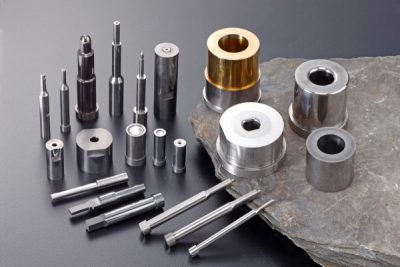
Definition of Tungsten Carbide:
Tungsten carbide (WC), also called cemented carbide, is a compound material produced by a process called powder metallurgy (PM). The process mixes tungsten-carbide powder with a binder, normally cobalt or nickel. The mixture is compacted in a mold and then sintered in a furnace to convert the powder into a solid block via using heat and pressure.
The word ‘cemented’ refers to the tungsten-carbide particles being mixed with the metallic binder matrix and cementing them together by sintering. The carbide industry normally refers to this material simply as carbide, but the terms solid carbide, tungsten carbide and cemented carbide are used also frequently.
Carbide materials is used in metal-stamping dies developed for long production life. They possess high compressive strength, resist deflection and retain their hardness values at high temperatures, a physical property especially useful in high-speed cutting, punching and forming. Some processes may only be possible with tungsten carbide punches, such as punching small-diameter holes in hard, tough materials.
Beneficial Properties of Carbide:
Hardness should be the most beneficial property of cemented carbide for metal-stamping. hardness is the most important physical property when it comes to wear resistance. However, hardness alone does not determine the success of the carbide grade in a particular wear application; Other significant factors include cobalt content and grain size. Hardness for cemented carbide usually is expressed in terms of Rockwell A (HRA) or Vickers values. Traditional tool steels, such as HSS, are expressed using the Rockwell C (HRC) scale. A traditional tool steel heat-treated and tempered to 62 HRC still remains relatively soft when compared to a 6-percent cobalt-grade carbide with a hardness value of 92 HRA.
Compressive strength is another important property of cemented carbide. Forgeable materials may plastically deform without fracturing when overloaded in compression. Brittle materials under similar conditions tend to fail suddenly. Cemented carbide shows quite high compressive strength when compared to most other materials. The compressive strength of cemented carbide increases with decreasing binder content and decreasing grain size. Tantalum carbides (TaC) reduce interface friction between the tooling because the tantalum works as a built-in lubricant within the micro structure, serving as an anti-galling agent.
Dongguan Jing Long Sheng Precision Mold Parts Co.,Ltd is a Chinese manufacturer of extremely hard tungsten carbide punches, precision tungsten punch, carbide punch with excellent wear resistance, tight tolerance up to 0.001mm, and corrosion resistance.





